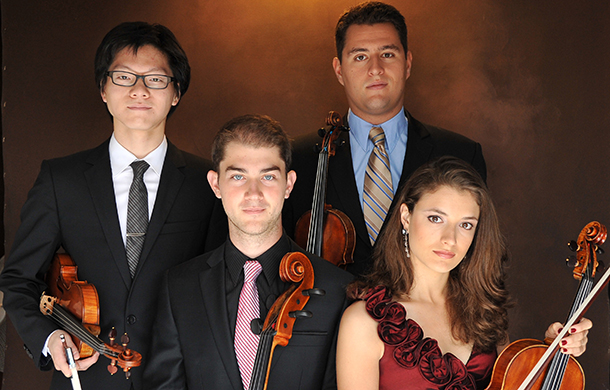The Dover Quartet shines brightly in Mozart and Smetana

The Dover Quartet performed Monday night at the Kennedy Center.
Since 2013 the Dover Quartet’s concerts in the area have been treasured musical experiences. The runaway winners of the Banff International String Quartet Competition in 2013 returned to the Kennedy Center’s Fortas Chamber Music Concerts series for the first time since their debut in 2014. The group, which released its first recording on the Cedille label in October, made the best of the limited acoustic of the Family Theater in a program of string quartets by Mozart, Caroline Shaw, and Smetana.
A Mozart quartet was the surprising disappointment of the Dover Quartet’s most recent concert in Washington, presented by Dumbarton Oaks. This concert’s Mozart, the Quartet in F Major (K. 590, “Prussian”), effaced that memory with a glowing sound that had no harshness in it. Violist Milena Pajaro-van de Stadt again stood out for her rich, loamy sound, shining when Mozart gave the sweet second theme to the viola in the recapitulation of the first movement. The development of this movement was dark, balanced, and contained, the sort of Mozart that even more experienced ensembles may struggle to find. Youthful exuberance led the group to juice the tempo (Allegro moderato) too much: comparison of the introduction and the main theme throughout the movement showed a slight increase in tempo after the attractive introductory material.
The highlight was the Andante because none of the four players attempted to dominate the texture; instead they created a creamy mixture of parts, the melodic lines always gently bumped in sound above the accompanying ones. They gave just the right subtle touch to Mozart’s surprise shifts into unexpected harmonic territory throughout this movement, letting the music speak for itself. The Minuetto had a meatier heaviness, perhaps a notch too much, as they dug into the downbeat, an excess heightened by the contrast with the lighter approach in the trio. In the finale each musician gave the buffo theme of running sixteenth notes exceptional clarity, making for a madcap romp to conclude the work.
In a touching tribute to their mentors, the Guarneri Quartet, the Dover Quartet has recorded this quartet and Mozart’s K. 589 on their debut recording, reproducing the same program on the Guarneri’s first recording. Those pieces are paired with Mozart’s extraordinary String Quintet in C Minor, joined by Michael Tree, the Guarneri’s founding violist.
The Dover Quartet has embraced Caroline Shaw’s new piece for string quartet, Plan & Elevation (The Grounds of Dumbarton Oaks), which received the group’s third performance in Washington. An additional hearing has not much altered my negative opinion of the work, although it sounded entirely pleasing because this group has lavished all its considerable power on it.
The five moments consist mostly of repetition of rather simple musical material: a three-note descending motif (the same as the opening of Three Blind Mice) in the first movement (“The Ellipse”); two chords that begin as a pizzicato pulse in the second (“The Cutting Garden”); an ascending scalar line woven through quoted snippets of string quartets by Ravel and Mozart; and so on. This is a time-honored compositional process, in the chaconne, for example, but what makes it work and not become boring is a much greater degree of variation than what Shaw provides.
Smetana’s autobiographical First String Quartet (E minor, “From My Life”) featured a much broader, romantic sound from the musicians. This was welcome in the striking viola solos of the first movement, played with fierceness by Pajaro-van de Stadt, on the part that was performed by Antonín Dvořák at the work’s premiere. It was not so welcome in that minor intonation issues, especially in the violins, were amplified by the more strident approach.
Results were better in the folksy second movement (“à la Polka”), full of earthy belly laughs, and especially in the B section of the movement, given an overdone sentimental character that was oozing and hilarious. The highlight was the ardent slow movement, which built from a tender cello solo by Camden Shaw into a full-blown, lyrical love song.
With irrepressible energy, the group attacked the playful themes of the finale until it crashed into silence, with the first violinist playing the high-pitched whine representing the onset of Smetana’s deafness. The composer revisits the episodes of his life in the previous movements, musical themes now steeped in tragic nostalgia, but the drift toward silence could not be stopped. Smetana described this quartet as “a circle of friends” in conversation about “what has oppressed me so significantly,” which was precisely the image conjured by this performance.
The next performance in the Fortas Chamber Music Concerts series will feature cellist Alisa Weilerstein, pianist Inon Barnatan, and clarinetist Anthony McGill, 7:30 p.m. January 19. kennedy-center.org/calendar/event/MRFSG; 202-467-4600.
